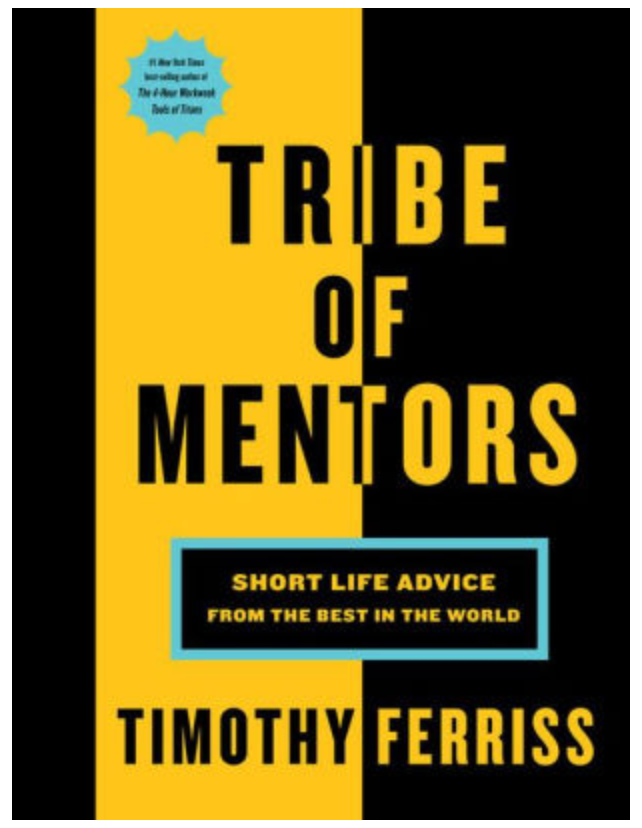After reading the book Tribe of Mentors by Tim Ferriss, I decided to answer his questions for myself. Below are my answers to his final five. How would you respond to these same questions? We’d love to hear your answers!
In the last five years, what new belief, behavior, or habit has most improved your life?
In the last several years I have begun the practice writing of a new year’s reflection on the past year. I am a big believer in goals, and I always spend time during New Year’s Day thinking about where I want my life to go and what I want to do with my next 365 days. However, I only recently began the practice of writing a reflection while looking back on my calendar and goals for the previous year. This has really helped me see my progress in life. It’s easy to take a quick look at what’s still on the goals list and say, “Well, I didn’t hit that target!” But, when you sit down and pay attention to all of the things you DID do, it is invigorating and breeds motivation for what’s to come.
What advice would you give to a smart, driven college student about to enter the “real world?” What advice should they ignore?
A dear friend once gave me great advice about raising children, and I think it applies here too. He said, “The best advice I can give you about raising your children is to politely listen to everyone else’s advice, and then do whatever you want to do anyway.” Advice is never in short supply. I would also add, “Don’t give a second thought to the advice of people who aren’t where you want to be in life.” If you want to make money and travel the world, then don’t listen to the advice of Broke Uncle Joe Who Never Left Town. Seek mentors and advisors who not only have your best interests at heart, but who are also out there living the dream. And finally, go with your gut. Your intuition is a power tool and should not be ignored.
What are bad recommendations you hear in your profession or area of expertise?
“Never give up.” I think that’s a romantic, archaic notion. I do believe you have to fight for your dreams and go after what you want in life, but sticking around just so you won’t be called a quitter is not necessarily a best practice. Sometimes you need to quit things- jobs, relationships, environments… the list goes on. I think the secret lies in knowing WHEN to quit something and when to persevere, but the idea of “never giving up-” that’s a bad plan.
In the last five years, what have you become better at saying no to (distractions, invitations, etc.)? What new realizations and/or approaches helped? Any other tips?
I had a major a-ha moment when I read Shauna Niequist’s book Present Over Perfect, and she said, “I’ve realized one thing that makes it hard for me to disappoint people is my tendency to overestimate how close I am to someone, and then how imperative it is that I don’t disappoint this dear, dear friend.” This is me to a tee. First of all, I hate to disappoint. Secondly, I want to be liked. People often ask me for help because they know I am reliable, creative and a generally great teammate. Sometimes I’m asked to run a race. Other times it’s volunteering for something at my kids’ school. However I’ve learned that with every yes I give, it has an equal and opposite no to something else. By saying yes to the school function I’m being asked to plan, I might be saying no to time with my kids and husband. It used to feel weird to say no to something when I didn’t really have a calendar conflict. I mean, my schedule is open. Why can’t I help? But, I’m learning to cherish the empty space on my calendar, because that seems to be where the magic happens. Niequist goes on to say, ” Picture your relationships like concentric circles: the inner circle is your spouse, your children, your very best friends. Then the next circle out is your extended family and good friends. Then people you know, but not well, colleagues, and so on, to the outer edge. Aim to disappoint the people at the center as rarely as possible.” That last sentence brought me so much clarity and has become my compass. I will always disappoint people when I give them a no, but now I aim to disappoint the people at my center as little as possible. With this simple tool, life is better and much less complicated for me.
When you feel overwhelmed or unfocused, or have lost your focus temporarily, what do you do? (If helpful: What questions do you ask yourself?)
I make lists. Often I brain-dump a list and then I will re-write the list in a more organized fashion. Many times I will fold a paper into four quadrants and organize the larger list into four separate mini-lists with the titles: urgent/important, urgent/less important, not urgent/still important and not urgent/not important. When I do this, I realize that the things I’m overwhelmed about are often down on the not urgent/not important list. I turn my focus to the urgent/important list and let the things on the other lists marinate a bit. I won’t forget them now because they’re on the list, but I don’t need to spend any mental energy on them just yet. This almost always eases my mind and brings me back to prioritizing what needs my attention most. It’s an excessive amount of list-making for sure, but the simple act of writing my mental clutter down in an organized way instantly calms my stress.

